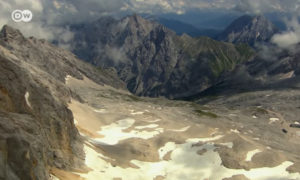Événement Ciné
Wednesdays for the Planet | Europe’s Melting Glaciers

Wednesdays for the Planet is a series of online screenings and virtual presentations with experts highlighting the natural world and other environmental challenges our planet faces. The virtual screenings are for educational purposes, non-profit and non-commercial.
Documentary
Europe’s Melting Glaciers
As the climate crisis progresses, more and more ice is melting. Presented by Deutsche Welle (DW), “Europe’s Melting Glaciers” show that it is perhaps far too late to save the Alpine glaciers. And now, the dangers caused by tons of melting ice are rising sharply. Every year, climate change is destroying two of the currently 70 square kilometers of glaciers left in the Alps.
The permafrost in the Alps is thawing, and transforming what used to be sturdy slopes into loose screes. In addition, climate change is leading to significantly more extreme weather conditions every year, while heavy rainfall causes serious erosion. The result: avalanches and landslides like those in Bondo, Switzerland, or Valsertal in Austria.
In Switzerland, residential areas are shrinking as people are forced to leave their homes forever. The disappearance of glaciers as water reservoirs is already posing a major problem. Farmers in Engadine, who have been using meltwater for irrigation for centuries, are already facing water shortages. In recent years during the summer months, they had to rely on helicopters to transport water to their herds in the Grison Alps. Above all, alpine villages depend on winter tourism to survive. Yet experts are forecasting that by mid-century, there will only be enough natural snow left to ski above 2,000 meters, which will spell out the end for about 70 percent of the ski resorts in the Eastern Alps. But instead of developing alternatives, lots of money is still being invested in ski tourism. Snow cannon are used to defy climate change, and artificial snow systems are under construction at ever higher altitudes.
As usual, it’s the environment that is set to lose as the unique alpine landscape is further destroyed by soil compaction and erosion. Some municipalities are now working on new models of alpine tourism for the future. As global temperatures continue to rise, the cooler mountain regions will become increasingly attractive for tourists, especially in the summer.
Online Screening
Experts

Matthias Huss
Head of Glacier Monitoring Switzerland | Scientific Member of Mountain Hydrology and Mass Movements Glaciology Research Unit at the Swiss Federal Research Institute WSL | Senior Lecturer at the Swiss Federal Institute of Technology Zurich
Matthias Huss is the Head of Glacier Monitoring Switzerland (GLAMOS) and a scientific member of the Mountain Hydrology and Mass Movements Glaciology Research Unit at the Swiss Federal Research Institute WSL. He is also a senior lecturer at the Laboratory of Hydraulics, Hydrology and Glaciology (VAW) at the Swiss Federal Institute of Technology Zurich (ETH Zurich). In addition, Matthias has authored and co-authored numerous publications, most notably the “Global-Scale Hydrological Response to Future Glacier Mass Loss (2018)” for Nature Climate Change, “A New Model for Global Glacier Change and Sea-Level Rise (2015)” for Frontiers in Earth Science, and “Distributed Ice Thickness and Volume of All Glaciers Around the Globe (2012)” for the Journal of Geophysical Research. Furthermore, he has won several awards such as the 2015 “Early Career Award” from the International Union of Geodesy and Geophysics (IUGG), the 2014 “Arne Richter Award” for outstanding young scientists from the European Geosciences Union (EGU), and the 2013 “Cryosphere Young Investigator Award” from the American Geophysical Union (AGU). Matthias holds a Ph.D. in Glaciology from the ETH Zurich.
Virtual Presentation
Links
Abstracts
- Accelerated Global Glacier Mass Loss in the Early Twenty-First Century | Nature | Romain Hugonnet, Robert McNabb, Etienne Berthier, Brian Menounos, Christopher Nuth, Luc Girod, Daniel Farinotti, Matthias Huss, Ines Dussaillant, Fanny Brun and Andreas Kääb | 28 April 2021
- Anthropogenic Warming Forces Extreme Annual Glacier Mass Loss | Nature Climate Change | Lauren J. Vargo, Brian M. Anderson, Ruzica Dadić, Huw J. Horgan, Andrew N. Mackintosh, Andrew D. King and Andrew M. Lorrey | 3 August 2020
- Global-Scale Hydrological Response to Future Glacier Mass Loss | Nature Climate Change | Matthias Huss and Regine Hock | 22 January 2018
Articles
- Melting Glaciers Could Release Disease or Uncover Cures: The Alps | CGTN | 26 August 2021
- Climate Change: IPCC Report is “Code Red for Humanity” | BBC | 9 August 2021
- Climate Change: The Conservationists “Tucking in” Glaciers for the Summer | BBC | 7 July 2021
- 0.5 Degrees Celcius: Small Difference, Large Effect | ETH Zurich | 15 June 2021
- Global Glacier Retreat has Accelerated| ETH Zurich | 28 April 2021
- Satellites Show World’s Glaciers Melting Faster Than Ever | Associated Press | 28 April 2021
- Glacier Observation from Space | World Glacier Monitoring Service (WGMS) | 5 March 2021
- What is the Current State of Glaciers Around the World? | WGMS | 3 February 2021
- How Much are Glaciers Contributing to Sea-Level Rise? | WGMS | 3 February 2021
- Climate Change Threatens “Most Alps Glaciers” | BBC | 7 December 2020
- Photographing Glacier Melt Over a Century and More | DW | 4 November 2020
- Glaciers and Climate Change | National Snow and Ice Data Center | 16 March 2020
- Climate Change is Threatening Switzerland’s Stunning Scenery | World Economic Forum | 15 October 2019
- Two-Thirds of Glacier Ice in the Alps “Will Melt by 2100” | The Guardian | 9 April 2019
- Why are Glaciers and Sea Ice Melting? | WWF
Reports
- Climate Change 2021: The Physical Science Basis | Intergovernmental Panel on Climate Change (IPCC) | August 2021
- Global Warming of 1.5 ºC | IPCC | October 2018
- Global Glacier Change Bulletin 2014-2015 | World Glacier Monitoring Service (WGMS)
